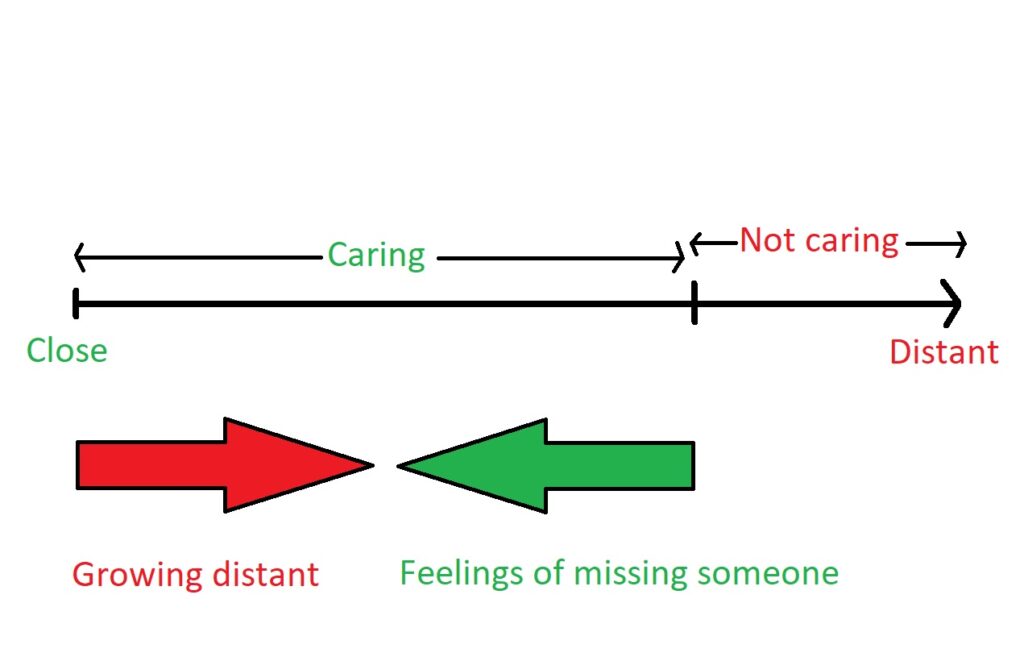Some people come into our lives and go like nothing happened. Some, when they go, leave a deep void in us. They leave behind an emptiness in us.
The closer our relationship with someone, the more it hurts when that relationship ends. The more we miss them when they go.

But why does it happen?
What are those bittersweet feelings of missing someone trying to accomplish?
Why do we miss people?
Being social species, social connection is huge for humans. We miss many things, but missing people can hurt the most.
Our ancestors lived in tightly-knit communities and depended on each other for their survival and reproduction. This is still true in modern times, despite globalization. No man is an island. No one can survive and thrive in this world on their own. Humans need other humans.
Because relationships are so important, your mind has mechanisms in place to check the health of your relationships. If things go wrong with someone important to you, your mind alerts you.
Missing someone and loneliness alerts and motivates you to repair that vital relationship.1
Communication is key (to repair)
One of the ways in which the mind determines that a relationship has gone bad is lack of communication. Communication is largely what keeps relationships alive.
When you haven’t talked to someone for long, your mind sends you warning signals in the form of missing that person. Missing someone can produce a cocktail of symptoms in you, including:
- A physical ache in the chest2
- Change in appetite
- Despair
- Regret
- Sadness
- Emptiness
- Trouble concentrating
- Insomnia
- Loneliness
That person you’re missing takes center stage in your mind. You think about them all the time and the memories you two shared. You can’t eat or you overeat. You can’t sleep or focus on your work or hobbies.
These symptoms overlap with the symptoms of depression. If you miss someone badly, you might end up depressed.
If communication is what keeps relationships alive and we miss those with whom our relationship has ended, restoring communication is the logical thing to do to stop missing them.
Of course, things aren’t always as simple as that.
What to do when you miss someone
Before deciding what action to take, you need to know where you stand with this person. The most important question to ask yourself is:
Do I want this person back in my life?
If the answer is ‘Yes’, you should do what you can to restore communication with them. You’ll no longer miss them once that happens, after your relationship gets re-kindled.
If the answer is ‘No’, you have to find ways to cope with your feelings. You need to dig deep into your psyche and figure out why you’re missing them so much.
Here are some of the things you can do:
1. Gain closure
If you were in a relationship with this person and then broke up, it’s possible you didn’t gain closure from them. By achieving closure, I mean being sure that you’ve moved on from this person.
If you haven’t fully moved on, you’ll keep missing them. Behind all this missing, there’s a hope that this person will come back. By gaining closure, you kill that hope.
We all have these zones of caring and not caring for others. For those in our zone of caring, we miss them when they grow distant (move to the right).

For instance, not talking to your spouse for 24 hours can make you miss them. Even though you know, they’re not leaving you. You want to maintain that level of closeness.
Similarly, our immediate family members also tend to be in our zone of caring. When we lose touch with them, we’re highly motivated to restore contact.
When you haven’t talked to someone who was once close to you, you get to a point where you stop caring about them. When you stop caring about them, you don’t miss them anymore. The relationship is dead.
You might occasionally miss them, though. But this missing is mere remembering. There’s no pain or emptiness attached to it.
Your mind can’t force you to miss this person badly because trying to get back with them would only waste time and energy.
2. Express your emotions
The end of a good relationship can be traumatic. While you’re working through your grief, you’re likely to be haunted by their memories. It’s a natural part of getting over someone. Give yourself time.
When you’re badly missing someone, your mind prioritizes the good moments you had with them. You tend to remember the fond memories while forgetting why the relationship ended. This is nothing but your mind’s trick to make you bring that person back into your life.
If you can’t do that, the next best thing to do is to express your emotions. Write a letter, read poetry, sing a song, talk to a friend- anything that can help you take things off your chest. Doing this will help you process what happened and move on.
3. Re-invent yourself
It’s natural for us to identify with our relationships. But if our identities lean too heavily on our relationships and we lose them, we lose a part of ourselves.
When you base your identity and self-worth on a relationship, it will be harder to get over the feelings of missing someone.
You’re not only trying to get them back; you’re also trying to get yourself back.
This is an excellent time to re-think the things you’ve come to identify with and base your identity on more stable foundations like core values and skills.
4. Make new connections
Is it the person you miss or how they made you feel that you miss?
Loving and missing someone comes down to chemical reactions in the brain. If someone made you feel a certain way, someone else can, too.
Just as we don’t eat the same type of food every time we’re hungry, you don’t necessarily have to fill that void in you with the same person.
References
- Cacioppo, J. T., Hawkley, L. C., Ernst, J. M., Burleson, M., Berntson, G. G., Nouriani, B., & Spiegel, D. (2006). Loneliness within a nomological net: An evolutionary perspective. Journal of research in personality, 40(6), 1054-1085.
- Tiwari, S. C. (2013). Loneliness: A disease?. Indian journal of psychiatry, 55(4), 320.
